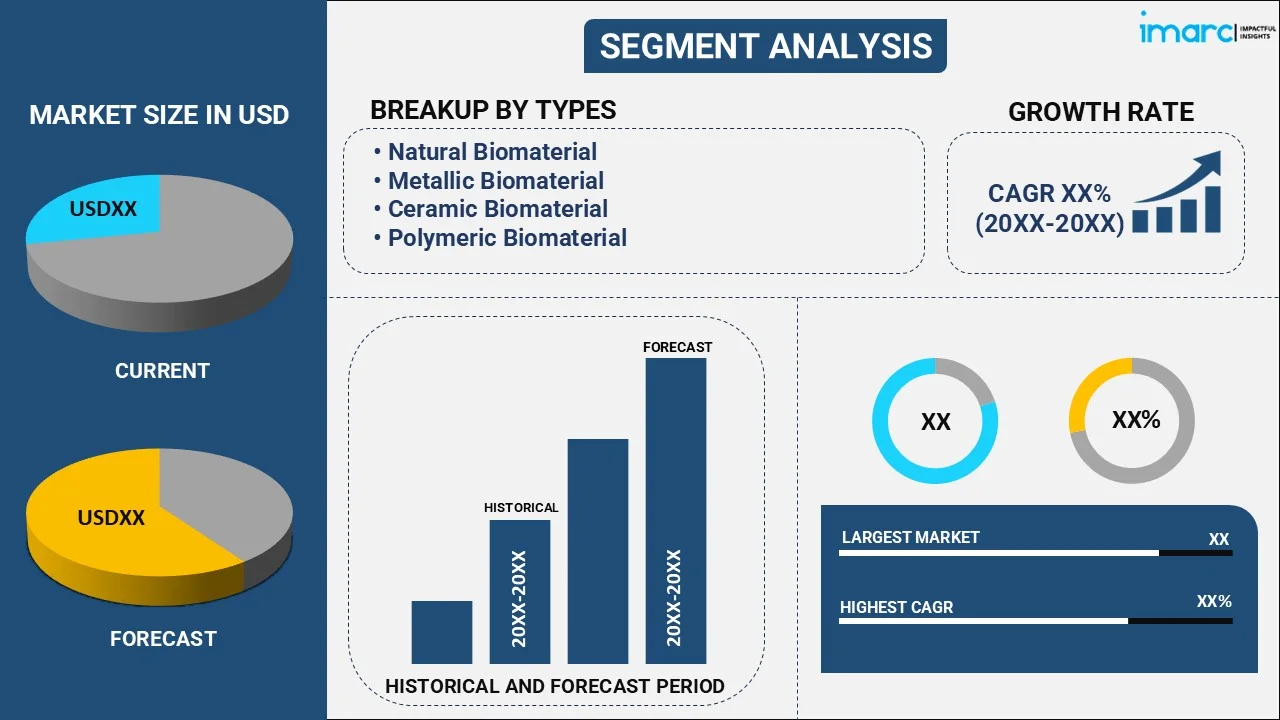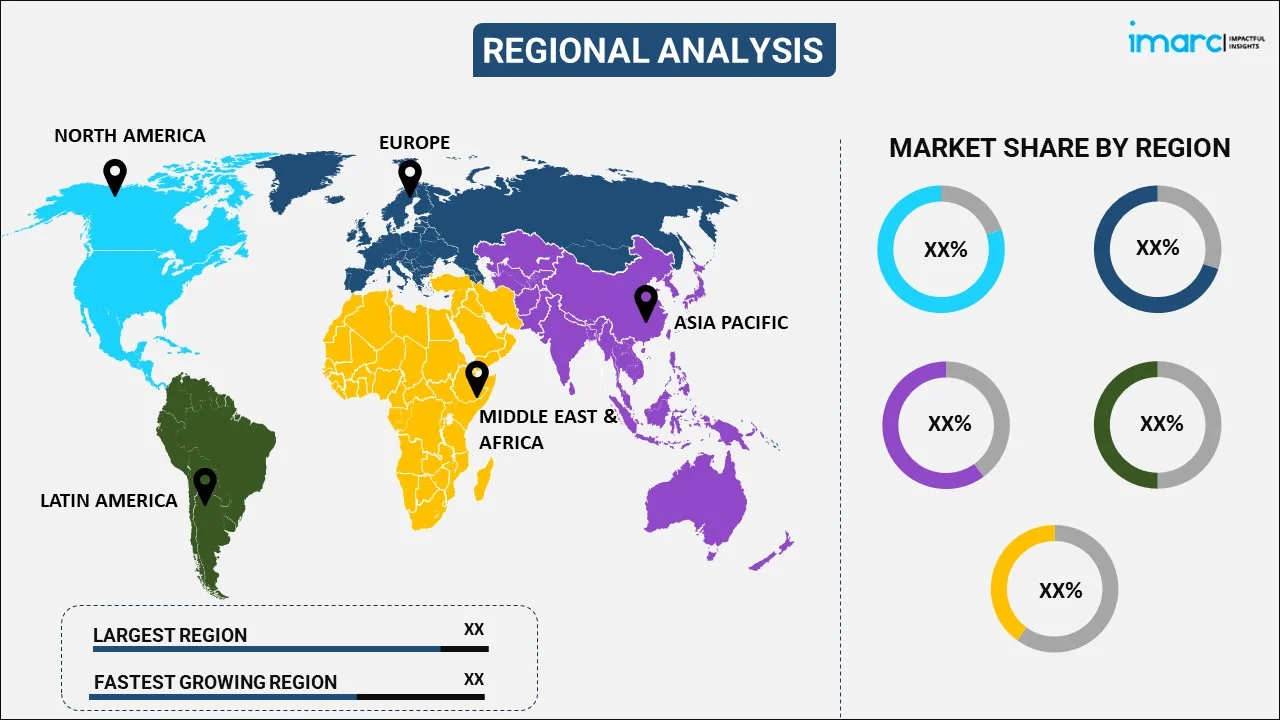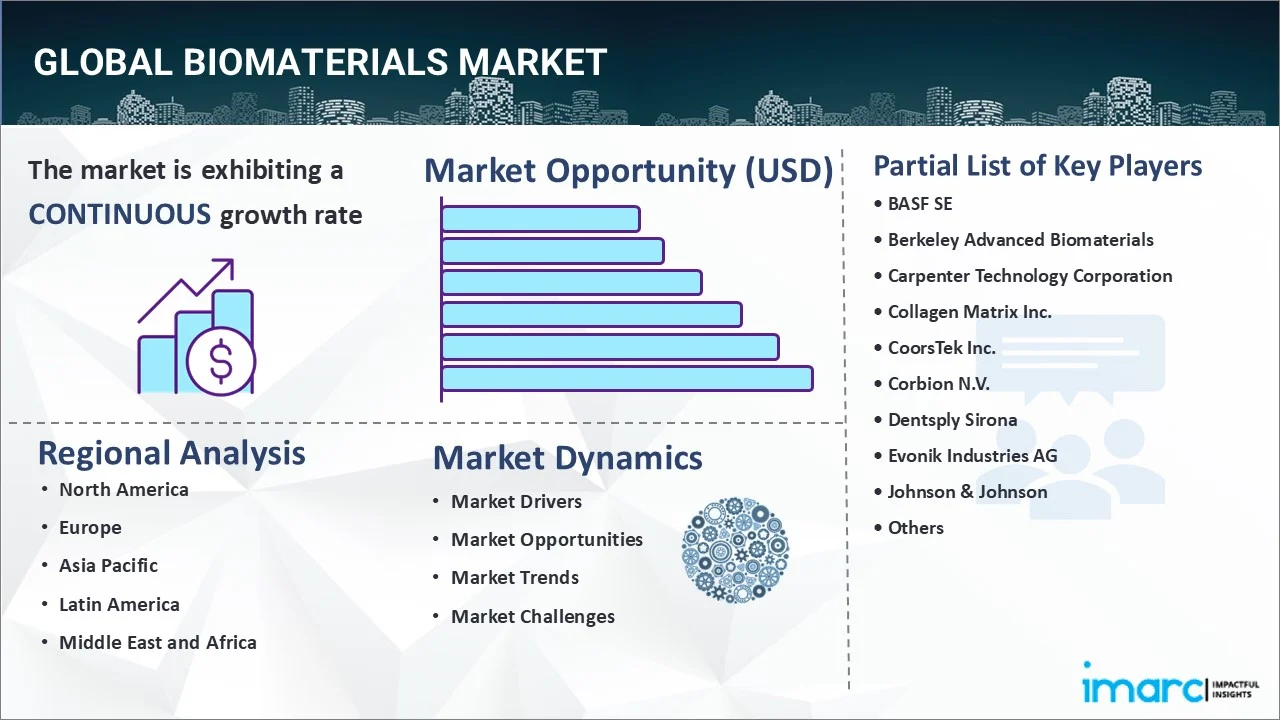
Biomaterials Market Report by Type (Natural Biomaterial, Metallic Biomaterial, Ceramic Biomaterial, Polymeric Biomaterial), Application (Neurology, Cardiology, Orthopedics, Wound Care, Dental, Plastic Surgery, and Others), and Region 2025-2033
Global Biomaterials Market:
The global biomaterials market size reached USD 126.1 Billion in 2024. Looking forward, IMARC Group expects the market to reach USD 289.7 Billion by 2033, exhibiting a growth rate (CAGR) of 9.7% during 2025-2033. Continuous advancements in the healthcare industry, along with the rising prevalence of cardiovascular diseases, are primarily propelling the market.
|
Report Attribute
|
Key Statistics
|
|---|---|
|
Base Year
|
2024
|
|
Forecast Years
|
2025-2033
|
|
Historical Years
|
2019-2024
|
|
Market Size in 2024
|
USD 126.1 Billion |
|
Market Forecast in 2033
|
USD 289.7 Billion |
| Market Growth Rate (2025-2033) | 9.7% |
Biomaterials Market Analysis:
- Major Market Drivers: The increasing number of individuals with musculoskeletal conditions represents one of the primary drivers stimulating the market. Additionally, the rising adoption of these materials in dissolvable sutures and dressings, staples, and clips for wound closure is also acting as another significant growth-inducing factor.
- Key Market Trends: Several advancements in polymer synthesis, protein and peptide engineering, molecular self-assembly, and microfabrication technologies are among the emerging trends bolstering the market.
- Geographical Trends: North America exhibits a clear dominance across the market, owing to the expanding geriatric population who often need medical interventions. Moreover, the inflating number of research institutions and robust healthcare infrastructures is impelling the growth of the regional market.
- Competitive Landscape: As per the biomaterials market overview, some of the prominent companies include BASF SE, Berkeley Advanced Biomaterials, Carpenter Technology Corporation, Collagen Matrix Inc., CoorsTek Inc., Corbion N.V., Dentsply Sirona, Evonik Industries AG, Johnson & Johnson, Koninklijke DSM N.V., Medtronic plc, Stryker Corporation, Victrex plc, and Zimmer Biomet, among many others.
- Challenges and Opportunities: Stringent regulatory frameworks and extensive preclinical testing are hampering the market. However, the introduction of more predictive in-vivo and in-vitro models to assess biocompatibility before clinical use is expected to augment the market over the forecasted period.
Biomaterials Market Trends:
Development of 3D Printing Technologies
The introduction of novel innovations, including 3D printing technologies, is improving the ways in which medical implants and devices are designed and manufactured. Moreover, they enable the production of patient-specific and complex shapes that are difficult or impossible to achieve with traditional methods. Consequently, these technologies find extensive applications in fields, such as dentistry, orthopedics, prosthetics, etc., where anatomical precision is crucial. This, in turn, is one of the lucrative biomaterials market recent opportunities. For example, in February 2024, Nanavati Max Super Specialty Hospital launched a medical 3D printing laboratory in Mumbai to facilitate high-precision surgeries. This pioneering facility is closely integrated with oncology to offer state-of-the-art precision surgeries that are required to be performed accurately and carefully in reconstructive orthopedic, oncologic, and specialized dentistry surgeries. Additionally, the widespread integration of 3D printing technology in biomaterials for creating customized and complex medical devices and implants tailored to individual patients' anatomies is further gaining extensive traction across the globe. For instance, in October 2023, a study was published that assisted the occupational therapists at the Haukeland University Hospital in Bergen to develop personalized hand orthoses by using 3D printing and scanning technologies, which can reduce pain, minimize deterioration, enhance patient compliance, etc. Apart from this, 3D printing allows for the incorporation of gradients of materials with varying mechanical properties, which is also positively influencing the market. For example, in October 2023, Evonik launched implant-grade filaments and carbon-fiber-reinforced PEEK for numerous medical applications. Furthermore, these technologies assist in the treatment of chronic diseases, which is projected to fuel the overall biomaterials market outlook in the coming years. For example, in July 2023, through joint research with the Korea Research Institute of Bioscience and Biotechnology, the Korea Institute of Machinery and Materials, and the institute under the jurisdiction of the Ministry of Science and ICT launched the world's first 3D bioprinting technology that enhances the function of natural killer (NK) immune cells.
Innovations in Tissue Engineering
Tissue engineering plays an important role in biomaterials research. It is gaining immense popularity for developing biological substitutes to maintain, restore, or improve tissue function. For example, in June 2023, OrganaBio announced the introduction of NeoPAC placenta and umbilical cord tissues that are specifically designed to accelerate the progress of regenerative medicine and cell therapy. Moreover, by providing both Research Use Only (RUO) and clinical-grade tissues, OrganaBio encourages researchers to tap into the potential of birth tissues, thereby enabling the development of innovative therapies to address numerous medical conditions. Apart from this, the rising demand for novel scaffolds that are materials engineered to cause desirable cellular interactions to facilitate the formation of new tissues is also elevating the market. For instance, in June 2023, 3DBioFibR, one of the leading innovators in tissue engineering, released two new collagen fiber products, namely CollaFibR 3D and μCollaFibR scaffold. These variants offer significant benefits for tissue culture and tissue engineering applications. Additionally, the elevating investments in R&D activities and research facilities by various organizations to enable the engineering of more structurally and functionally accurate tissues are contributing to the biomaterials market revenue. For example, in January 2023, the National Institute of Biomedical Imaging and Bioengineering (NIBIB) established the Center for Biomedical Engineering Technology Acceleration (BETA Center), a new intramural research program to accelerate the validation, development, and dissemination of cutting-edge technologies. The center focuses on several areas, such as biosensing, engineered and synthetic biology, biomedical imaging, nanomaterials and biomaterials, etc.
Growing Applications in Wound Dressings
The rising adoption of biomaterials in advanced wound dressings, as they help in improving the healing process and outcomes for numerous types of wounds, including acute and chronic injuries, is acting as a significant growth-inducing factor. Besides this, key players are developing sustainable materials for wound care. For example, in March 2024, a team of scientists at the Institute of Advanced Study in Science and Technology (IASST), under the Department of Science and Technology, introduced an eco-friendly wound dressing material made using banana fibers. Moreover, all the materials utilized in creating this innovative dressing material are locally available and natural, making the manufacturing process cost-effective, simple, and non-toxic. Apart from this, the increasing inclination towards bio-material-based wound dressings is elevating the biomaterials market prices. They can be produced from various materials, including foams, hydrogels, films, etc., that are often imbued with bioactive substances like antimicrobial agents to reduce infection and promote tissue regeneration. For instance, in May 2022, Amferia AB, a Swedish medical device startup, was granted a foundational patent by the U.S. Patent and Trademark Office (USPTO) for an antimicrobial material based on an amphiphilic antimicrobial hydrogel. In line with this, in June 2023, according to the findings published in the Journal of Biomaterials Advances, a team of researchers from Queen's University of Belfast designed a 3D printed bandage, also called a scaffold, which presents an innovative method of treatment to heal diabetic foot ulcers (DFUs).
Global Biomaterials Market Segmentation:
IMARC Group provides an analysis of the key trends in each segment of the market, along with the biomaterials market forecast at the global, regional, and country levels for 2025-2033. Our report has categorized the market based on the type and application.
Breakup by Type:

- Natural Biomaterial
- Metallic Biomaterial
- Ceramic Biomaterial
- Polymeric Biomaterial
Currently, metallic biomaterial accounts for the largest market share
The report has provided a detailed breakup and analysis of the market based on the type. This includes natural biomaterial, metallic biomaterial, ceramic biomaterial, and polymeric biomaterial. According to the report, metallic biomaterial represented the largest segmentation.
The growth in this segmentation is driven due to exceptional strength, optimal durability, and enhanced biocompatibility exhibited by metallic biomaterials. Consequently, they find extensive load-bearing applications, including dental implants, orthopedic implants, cardiovascular devices, etc. For instance, in April 2024, Boston Micro Fabrication (BMF) announced the U.S. Food and Drug Administration (FDA) clearance for its innovative UltraThineer material. Moreover, several metals, such as stainless steel, titanium, cobalt-chromium alloys, etc., are widely used, owing to their superior mechanical properties that ensure longevity and resilience under the stress of bodily movements. For example, in January 2022, according to the journal Colloids and Surfaces A, researchers efficiently modified a TC26 alloy with nanoporous TiO2 to enhance the osseointegration and bioactivity of artificial implants. In addition to this, in June 2023, Technopolis Moscow SEZ announced the production of titanium implants. As a result, the increasing product applications will continue to drive the metallic biomaterials market demand in the coming years.
Breakup by Application:
- Neurology
- Cardiology
- Orthopedics
- Wound Care
- Dental
- Plastic Surgery
- Others
The report has provided a detailed breakup and analysis of the market based on the application. This includes neurology, cardiology, orthopedics, wound care, dental, plastic surgery, and others.
Durable ceramic, metallic, and polymer-based materials are essential for joint replacements and bone repair. Moreover, they are adopted in the manufacturing of reconstructive devices that require high compatibility and strength with oral tissues. Apart from this, key areas, including neurology and cardiology, require biomaterials for neural implants, brain-machine interfaces, stents, pacemakers, etc. For instance, in February 2022, Researchers at the Lundquist Institute for Biomedical Innovation, Penn State, and the University of California Los Angeles developed novel biomaterials to promote new blood vessels and target post-stroke immune responses. According to the biomaterials market statistics, the other category encompasses additional applications like drug delivery systems and ophthalmology, where biomaterials offer tailored solutions for implants and controlled medication release, respectively.
Breakup by Region:

- North America
- United States
- Canada
- Asia-Pacific
- China
- Japan
- India
- South Korea
- Australia
- Indonesia
- Others
- Europe
- Germany
- France
- United Kingdom
- Italy
- Spain
- Russia
- Others
- Latin America
- Brazil
- Mexico
- Others
- Middle East and Africa
North America currently dominates the global market share
The market research report has also provided a comprehensive analysis of all the major regional markets, which include North America (the United States and Canada); Asia Pacific (China, Japan, India, South Korea, Australia, Indonesia, and others); Europe (Germany, France, the United Kingdom, Italy, Spain, Russia, and others); Latin America (Brazil, Mexico, and others); and the Middle East and Africa. According to the report, North America accounted for the largest biomaterials market share.
The favorable regulatory environment in North America, particularly the role of the U.S. Food and Drug Administration (FDA), which supports the rapid approval and development of new biomaterials and medical devices, is fueling the regional market. For example, in November 2019, DiFusion Inc. received FDA approval for its Xiphos-ZF spinal interbody device, which is based on a different biomaterial Zfuze, a combination of titanium and poly-ether-ether-ketone. Additionally, in October 2023, Dimension Inx, one of the biomaterials platform companies, announced the FDA approval of CMFlex, the first 3D-printed regenerative bone graft product. Moreover, the growing number of ambulatory surgical centers (ASCs) that perform spinal surgeries is acting as another significant growth-inducing factor. For instance, in February 2023, according to Becker's Healthcare data showcased that more than 183 ASCs in the United States perform minimally invasive spine surgery (MISS). Apart from this, the inflating popularity of cosmetic surgeries is further stimulating the regional market. In addition, the launch of initiatives undertaken by several public and private organizations, including the National Science Foundation and the National Institute of Standards and Technology, which provide assistance pertaining to biomaterials usage, is expected to fuel the market in North America over the forecasted period.
Competitive Landscape:
The market research report has provided a comprehensive analysis of the competitive landscape. Detailed profiles of all major biomaterials market companies have also been provided. Some of the key players in the market include:
- BASF SE
- Berkeley Advanced Biomaterials
- Carpenter Technology Corporation
- Collagen Matrix Inc.
- CoorsTek Inc.
- Corbion N.V.
- Dentsply Sirona
- Evonik Industries AG
- Johnson & Johnson
- Koninklijke DSM N.V.
- Medtronic plc
- Stryker Corporation
- Victrex plc
- Zimmer Biomet
(Please note that this is only a partial list of the key players, and the complete list is provided in the report.)
Biomaterials Market Recent Developments:
- February 2024: 3D Systems, one of the U.S.-based 3D printer manufacturers, launched its new multi-material 3D printed denture offering.
- February 2024: Researchers from MIT introduced a 3D-printable tissue adhesive that demonstrates superior tissue adhesion. This technology holds immense potential for enhancing biomedical devices and wound care applications.
- January 2024: Evonik introduced the world’s first carbon-fiber-reinforced PEEK filament for long-term 3D-printed medical implants.
- January 2024: restor3d, one of the musculoskeletal implant specialists, successfully commercialized femoral implants produced via a previously cleared additive manufacturing method, outperforming the mechanical properties of cast implants.
Biomaterials Market Report Scope:
| Report Features | Details |
|---|---|
| Base Year of the Analysis | 2024 |
| Historical Period | 2019-2024 |
| Forecast Period | 2025-2033 |
| Units | Billion USD |
| Scope of the Report | Exploration of Historical Trends and Market Outlook, Industry Catalysts and Challenges, Segment-Wise Historical and Predictive Market Assessment:
|
| Types Covered | Natural Biomaterial, Metallic Biomaterial, Ceramic Biomaterial, Polymeric Biomaterial |
| Applications Covered | Neurology, Cardiology, Orthopedics, Wound Care, Dental, Plastic Surgery, Others |
| Regions Covered | Asia Pacific, Europe, North America, Latin America, Middle East and Africa |
| Countries Covered | United States, Canada, Germany, France, United Kingdom, Italy, Spain, Russia, China, Japan, India, South Korea, Australia, Indonesia, Brazil, Mexico |
| Companies Covered | BASF SE, Berkeley Advanced Biomaterials, Carpenter Technology Corporation, Collagen Matrix Inc., CoorsTek Inc., Corbion N.V., Dentsply Sirona, Evonik Industries AG, Johnson & Johnson, Koninklijke DSM N.V., Medtronic plc, Stryker Corporation, Victrex plc and Zimmer Biomet. |
| Customization Scope | 10% Free Customization |
| Post-Sale Analyst Support | 10-12 Weeks |
| Delivery Format | PDF and Excel through Email (We can also provide the editable version of the report in PPT/Word format on special request) |
Key Benefits for Stakeholders:
- IMARC’s report offers a comprehensive quantitative analysis of various market segments, historical and current market trends, market forecasts, and dynamics of the biomaterials market from 2019-2033.
- The research study provides the latest information on the market drivers, challenges, and opportunities in the global biomaterials market.
- The study maps the leading, as well as the fastest-growing, regional markets. It further enables stakeholders to identify the key country-level markets within each region.
- Porter's five forces analysis assist stakeholders in assessing the impact of new entrants, competitive rivalry, supplier power, buyer power, and the threat of substitution. It helps stakeholders to analyze the level of competition within the biomaterials industry and its attractiveness.
- Competitive landscape allows stakeholders to understand their competitive environment and provides an insight into the current positions of key players in the market.
Key Questions Answered in This Report
The global biomaterials market was valued at USD 126.1 Billion in 2024.
We expect the global biomaterials market to exhibit a CAGR of 9.7% during 2025-2033.
The rising demand for biomaterials, as they assist in restoring several functions and facilitating healing among individuals after an injury or a disease, is primarily driving the global biomaterials market growth.
The sudden outbreak of the COVID-19 pandemic had led to the postponement of elective neurology, cardiology, and orthopedics surgical procedures to reduce the risk of the coronavirus infection upon hospital visits and interaction with medical equipment, thereby negatively impacting the global market for biomaterials.
Based on the type, the global biomaterials market can be categorized into natural biomaterial, metallic biomaterial, ceramic biomaterial, and polymeric biomaterial. Currently, metallic biomaterial accounts for the largest market share.
On a regional level, the market has been classified into North America, Asia-Pacific, Europe, Latin America, and Middle East and Africa, where North America currently dominates the global market.
Some of the major players in the global biomaterials market include BASF SE, Berkeley Advanced Biomaterials, Carpenter Technology Corporation, Collagen Matrix Inc., CoorsTek Inc., Corbion N.V., Dentsply Sirona, Evonik Industries AG, Johnson & Johnson, Koninklijke DSM N.V., Medtronic plc, Stryker Corporation, Victrex plc, and Zimmer Biomet.
Need more help?
- Speak to our experienced analysts for insights on the current market scenarios.
- Include additional segments and countries to customize the report as per your requirement.
- Gain an unparalleled competitive advantage in your domain by understanding how to utilize the report and positively impacting your operations and revenue.
- For further assistance, please connect with our analysts.

 Request Customization
Request Customization
 Speak to an Analyst
Speak to an Analyst
 Request Brochure
Request Brochure
 Inquire Before Buying
Inquire Before Buying




.webp)




.webp)












